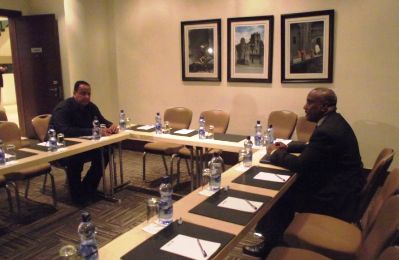Sudanese government, SPLM-N resume peace talks in Addis Ababa
April 22, 2014 (KHARTOUM) – Peace talks between the Sudanese government and the rebel Sudanese People’s Liberation Movement-North (SPLM-N) have resumed in the Ethiopian capital, Addis Ababa, on Tuesday in a new bid to end the nearly three-year-long conflict in South Kordofan and Blue Nile states.

However, the AU Peace and Security Council (AUPSC) reiterated its support for his mediation efforts and requested the panel to broker a peace deal before the end of April.
The AUHIP confirmed the resumption of talks as scheduled in a short tweet on Tuesday. Sources from the venue of the peace process in Addis Ababa also told Sudan Tribune the mediation, on the first day of negotiations, received both parties’ position on the contentious issues.
It said both sides had expressed a readiness to engage in direct talks.
The head of the government negotiating team, Ibrahim Ghandour, and the head of the SPLM-N negotiating team, Yasir Arman, held a closed-door meeting which continued until late at night. They are expected to meet again on Wednesday in presence of Mbeki.
Before Tuesday’s meeting, Mbeki requested the heads of the two delegations to sit together in order to narrow the gaps and to identify their disagreements regarding the draft framework agreement he had proposed on 18 February before to suspend the discussions.
Sudan Tribune has learnt that Mbeki reiterated to the two parties the need to make a breakthrough and reach a cessation of hostilities enabling the start of humanitarian operations to deliver aid to affected civilians, particularly in rebel-held areas.
In its position paper, the government focused on the need to declare a comprehensive ceasefire, but stressed that it should not only be for humanitarian purposes. Khartoum has further demanded that the tripartite initiative be used as a mechanism for the delivery of relief supplies.
The government also rejects engagement in a bilateral political partnership with the SPLM-N apart from the other political parties, as was previously agreed in the 28 June framework agreement with regard to the democratic transition process.
Khartoum argues that the national dialogue process, which aims to involve all political forces, should not be hampered by such a clause.
In an extraordinary meeting held from 31 March to 3 April, the SPLM-N leadership reiterated its rejection of partial solutions, saying they stood by their position that a comprehensive solution is the only option.
Arman told reporters on Tuesday that the SPLM-N wants a comprehensive solution and stressed that the conflict in Blue Nile and South Kordofan states should be resolved within this national framework.
The conflict of the Two Areas “cannot be separated from the issue of Sudan. The movement’s leadership has confirmed this position in its the last meeting in the Nuba Mountains,” Arman said.
He further reiterated the SPLM-N’s willingness to immediately halt hostilities, asking Khartoum to allow aid groups to deliver humanitarian assistance to affected civilians in all the war zone areas in Blue Nile and South Kordofan, but also in Darfur region and North Kordofan state.
The rebel leader further said that the current conditions created by the recent surge in militia attacks on civilians in Darfur and the Two Areas is unfavourable for dialogue with the regime.
The deputy chairman of the government negotiating team, Omer Suleiman, said in statements in Khartoum prior to leaving for Addis Ababa that they will extend Sudanese president Omer Hassan Al-Bashir’s invitation for national dialogue to the SPLM-N.
The rebel alliance of the Susan Revolutionary Forces (SRF), which includes the SPLM-N, rejected Bashir’s call for dialogue and demanded the government hold direct talks with them to negotiate a cessation of hostilities and open humanitarian access to civilians in rebel areas.
Suleiman said the government delegation for peace talks on the Two Areas is comprised of six political parties, underscoring the government’s seriousness to achieve peace.
“We would go to negotiations with full powers and will to discuss the major issues,” he added.
He said the delegation would negotiate on three tracks, including security, humanitarian, and political issues, saying reaching an agreement on security arrangements will lead to a ceasefire which allows aid groups to deliver food, drugs, as well as medical and humanitarian services, to conflict-affected people.
Sudan’s commissioner of humanitarian aid and member of the negotiating team, Suleiman Abdel-Rahman, said the delegation is fully authorised to negotiate a comprehensive solution, adding that they are ready to reach humanitarian deal within the framework of the comprehensive solution.
(ST)
